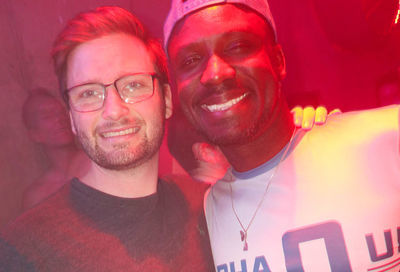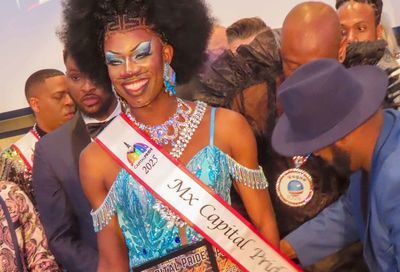Gay Republicans React to Iowa
Whether hoping for a Rubio surge or a Trump rebound, LGBT issues bear little weight on gay Republicans’ choice of candidate

“This is one of the best possible outcomes,” Anthony LeCounte says cheerfully, as he watches the results from Monday’s Iowa GOP caucuses. It’s clear the poll-ordained frontrunner for the nomination, Donald Trump, has finished second, four percentage points and more than 6,000 votes behind Texas Sen. Ted Cruz.
For LeCounte, a 26-year-old Republican from Prince William County, Va., who supports Florida Sen. Marco Rubio, Trump’s loss is cause célèbre — it wounds the man who potentially poses the biggest obstacle to a Rubio win in the upcoming New Hampshire primary. Already, the pundit class is declaring that the momentum is with Rubio, who is receiving accolades for a strong third place showing in the Hawkeye State. He finished just 1 percent behind Trump, with 23 percent of the vote.
“I kept saying repeatedly, ‘It ain’t over until all the votes are in, y’all need to relax,’” LeCounte says in his trademark Southern drawl. “Polls can say whatever they want to, but we’ve had ample reason in the past couple of years to be suspicious — especially in a situation like the Iowa caucuses, which are notoriously hard to poll.”
LeCounte has multiple reasons to be pleased: besides significantly outperforming his expected vote share, Rubio netted a key endorsement from South Carolina GOP senator Tim Scott. Scott, one of the South Carolina’s most popular politicians, is someone who could help the Florida senator herd voters to the polls in the GOP primary there on Feb. 20.
A strong showing in South Carolina could help Rubio wrap up his party’s nomination, much in the same way that Arizona Sen. John McCain emerged as the consensus choice after his South Carolina victory during the 2008 primaries. From LeCounte’s perspective, that would be a plus, as he believes Rubio is the Republican that Democrats fear the most in a general election, and who would provide the starkest contrast with presumptive Democratic frontrunner Hillary Clinton.
Gregory T. Angelo, executive director of the national Log Cabin Republicans, knows many members of his organization are making their own decisions to support their preferred candidates. However, Log Cabin will not be endorsing any candidate during the primary. Once a nominee is chosen, LCR’s board will consider issuing a formal endorsement, but it’s still early. Board members have only just started conversations about potential criteria to consider when making an endorsement.

“When you look at the field of GOP candidates for president, it’s not as easy to paint them as anti-gay as Democrats would have you believe,” Angelo says. “Clearly, there’s a lot more advocacy that needs to be done for just about every candidate for president of the United States. But it’s also important to point out things, such as, Dr. Ben Carson sat on several boards of directors at a time when they passed LGBT nondiscrimination policies.
“It’s important to point out that Donald Trump is on record as saying he supports amending the Civil Rights Act to include sexual orientation nondiscrimination…. You have Gov. Kasich, who has attended a same-sex marriage. All of those things show, at the very least, a sympathy for and an understanding of some nuances with LGBT rights, even if candidates are not supportive of, say, marriage equality.”
But Angelo also notes that most LGBT conservatives are not single-issue voters, swayed only by a candidate’s support for pro-equality initiatives. It’s a common refrain among many gays who identify with the GOP on bigger issues ranging from national security to taxes to health care.
Matthew Shuman, 27, of Washington, is a Rubio supporter who says the senator’s outreach to millennial voters and his reasonable stance on immigration, compared to other GOP candidates, won him over. Rubio’s performance in Iowa met his expectations, though he also adds that even a poor showing would not have changed his candidate preference.
“Sen. Rubio could come last in Iowa, and I would still support him,” Shuman says. “After all, Santorum won the Iowa caucus, and, fortunately, he is not in the White House.”
When it comes to LGBT issues, Shuman notes Rubio believes sexual preference is something you’re born with, even though he also believes that the definition of marriage should be between one man and one woman. But Rubio’s stance is consistent with Shuman’s own upbringing as a Christian conservative. Furthermore, he adds, Rubio believes that states should be able to define marriage for themselves, without intrusion from federal courts.

“Sen. Rubio gives respect to all, and when he met me, an openly gay Republican, he had no issues with that,” Shuman says. “I think Marco Rubio is a very sincere and genuine man. I don’t think he is going to undo any of the pro-LGBT policies that have come out the past few years. He did come out and make a statement that he doesn’t believe the courts should be legislating, and I agree with that. I think many people in the gay community also agree that courts should not be making laws if they are actually involved in policy.”
Meanwhile, Adam Savit, 35, of Washington, is solidly in the Trump camp. He was “moderately disappointed, but not devastated” with Trump’s showing in Iowa, but believes his candidate will recover.
“Much of his campaign is based on the momentum itself, and on his personality, and therefore, the fact that he lost sort of punctures that image,” says Savit. “However, when you look at things realistically, he’s polling ahead in every other state, including New Hampshire. So when the fickle media gets around in eight days to calling New Hampshire for him, the narrative will change again.”
Savit believes Trump’s populist appeals on the stump and positions on issues resonate with many voters and make him the most viable candidate in a general election.
“I just think — more important than any policy, because I don’t think he is a doctrinaire conservative — [he’s displaying] a style that has been lacking the last eight years, which I believe has been negative on the United States,” Savit says. “Shrinking on the world scene, seeing American influence as a negative, whereas, in the net, it’s a positive. We should be stronger.”
As for LGBT issues, they really don’t factor into Savit’s decision. Besides, he doesn’t think Trump is anti-gay in any important sense.
“I think the president, except for tone, has very little effect on social issues,” he says. “I think we’ve seen that the Supreme Court does have an effect on it, because of the way the cases were brought, but generally speaking, it’s a matter of changing people’s minds on a grassroots level, on a family-to-family level, a local level.
“My primary concern regarding LGBT issues is individual rights,” Savit continues. “So my concern is having an America that’s confident and strong, and having it as an experimentation ground for all sorts of social and economic issues, including LGBT issues, leaving that to people, leaving that to state governments. And I don’t think the president should or can be the main mover on that.”
Support Metro Weekly’s Journalism
These are challenging times for news organizations. And yet it’s crucial we stay active and provide vital resources and information to both our local readers and the world. So won’t you please take a moment and consider supporting Metro Weekly with a membership? For as little as $5 a month, you can help ensure Metro Weekly magazine and MetroWeekly.com remain free, viable resources as we provide the best, most diverse, culturally-resonant LGBTQ coverage in both the D.C. region and around the world. Memberships come with exclusive perks and discounts, your own personal digital delivery of each week’s magazine (and an archive), access to our Member's Lounge when it launches this fall, and exclusive members-only items like Metro Weekly Membership Mugs and Tote Bags! Check out all our membership levels here and please join us today!

























You must be logged in to post a comment.